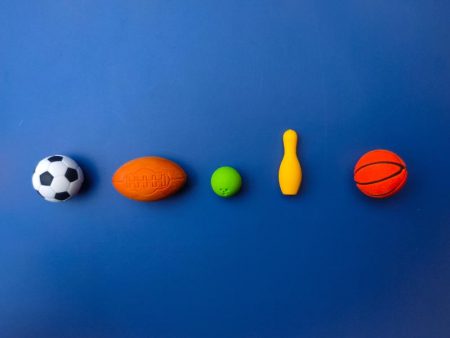Sporting Integrity Explained
Sports involve many different participants, from fans, to players, coaches, and administrators. Integrity is essential for all these people to ensure fair play is maintained and that the athletes are competing on a level playing field. Sporting integrity means not only letting athletes compete fairly, but also upholding the highest ethical standards in the sport.
Protecting Athletes
Athletes have a right to compete without fear of corruption or manipulation. It is up to the governing bodies of each sport to ensure that athletes are protected against dangerous levels of performance-enhancing drugs, as well as any other unfair advantages that could skew competition.
Protecting Spectators
To maintain the integrity of sports, spectators must be reassured that athletes are giving it their all and competing fairly. Spectators need to know that the games are being controlled in an ethical and transparent way, and that the results are based on skill and competitive spirit, rather than corruption or match-fixing.
Protecting Sports
When it comes to sports, reputation is everything. Sporting integrity is essential to maintaining a positive image for the sport. If fans think that a sport is corrupt or unsafe to participate in, it may cause viewership and participation to decline. It is important for sports organizations to uphold and maintain the highest level of integrity to protect their reputation.
Maintaining Sporting Integrity
To maintain the highest level of sporting integrity, there are a few key points that must be adhered to:
- Anti-doping measures: Sports organizations must have strict anti-doping regulations and standards in place, and be equipped to enforce them.
- Anti-corruption measures: There must be policies in place to prevent and detect any forms of corruption or match-fixing.
- Transparency: Results of competitions must be released in a timely and transparent manner.
- Education: Athletes and fans must be educated on the importance of upholding sports integrity.
Sporting integrity is essential for the success of any sport. It is up to the governing bodies and athletes to ensure that the highest standards of integrity are maintained and that fairness is upheld. This helps to ensure that spectators and participants are able to enjoy and participate in sports without any fear of manipulation or corruption.
What are examples of sportsmanship and integrity?
1. Playing fair and respecting the rules.
2. Accepting defeat with dignity and grace.
3. Setting a positive example through honorable behavior.
4. Handling disagreements with other players in a respectful manner.
5. Giving credit where it is due and congratulating the opponent after a tough match.
6. Refusing to partake in cheating or unsportsmanlike conduct.
7. Acknowledging mistakes and playing with humility.
8. Keeping emotions in check and not allowing them to affect performance.
9. Respecting the officials and their decisions.
10. Admiring excellence in others and praising their achievements.
What is the difference between sportsmanship and integrity?
Sportsmanship is the quality of being respectful and displaying fair play in the context of sports and competition, while integrity is the quality of being honest and having strong moral principles; it includes adhering to personal values and principles, even when faced with difficult decisions. Sportsmanship involves treating your opponents and teammates with respect, while integrity involves making choices that reflect one’s values.
What is the relationship between sportsmanship and integrity?
Sportsmanship and integrity are closely related in that they both involve being honest, responsible, and respectable in one’s behavior while playing or participating in sports. Integrity involves being truthful, sincere, and consistent and living up to ethical values and moral standards, while sportsmanship is the practice of making the game fairer, safer, and more enjoyable for everyone by exhibiting respect for other players, officials and rules. Ultimately, they are intertwined in that they both require players to be accountable for their actions and make conscious decisions in order to play fairly and show respect to those around them.
What are examples of sportsmanship and integrity?
Examples of sportsmanship and integrity include being a gracious winner and good loser by congratulating and commending your opponent win or lose, following the rules and never attempting to gain an unfair advantage, accepting the judgment of referees and opponents and always being honest in the heat of competition. Showing respect to ones opponents, teammates, coaches and leaders, refraining from talking trash and displaying a cooperative attitude even in a competitive situation and playing fair in practice as well as on the field are all signs of sportsmanship and integrity.
What is the difference between sportsmanship and integrity?
Sportsmanship is about treating one’s opponents with respect, playing fairly, and accepting victory or defeat graciously. Integrity is about behaving in a manner which is honest, ethical, and morally upright, regardless of personal gain, external pressure, or the presence of witnesses. Sportsmanship is the behavior expected of an athlete while integrity is a personal quality and value system. Sportsmanship and integrity are both essential for a successful sports career.
What is the importance of sportsmanship and integrity?
Sportsmanship and integrity are essential elements of any athletic competition. Sportsmanship is essential because it promotes respect, good discipline, and the ability to work together. It encourages players to be accountable for their own actions and face the consequences of their decisions. It also helps create a positive atmosphere where all players can compete in an enjoyable and fair manner. Integrity is also important as it helps promote honest and ethical competition, as well as encouraging players to take personal responsibility for their actions. Having sportsmanship and integrity can help create a successful athletic environment and help ensure that everyone can have the best possible experience.
What are the benefits of sportsmanship and integrity?
1. Respect: Good sportsmanship and integrity can foster respect among teammates and opponents, leading to a more enjoyable experience for all involved.
2. Teamwork: Sportsmanship and integrity can help promote teamwork and team collaboration, resulting in better overall performance.
3. Perseverance: Players will be encouraged to remain positive and focus on doing their best despite the obstacles they face.
4. Character: Sportsmanship and integrity can help build character and teach players to be respectful and responsible, leading to greater self-confidence both on and off the field.
5. Leadership: These values can help players develop leadership skills, enabling them to become strong advocates for good sportsmanship and integrity in their communities.
6. Self-Discipline: Players will learn the value of hard work, dedication and self-discipline, which will help them achieve their goals in life.
What is an example of sportsmanship and integrity?
An example of sportsmanship and integrity would be a sports team recognizing the outstanding performance of the opponents, even if they lost the match. The team would respect the opponents’ efforts and accept the result graciously with understanding, humility, and grace. By doing this, the team will be demonstrating their commitment to fair play and integrity and showing that they are not only team players but also good sports.
What are the qualities of a good sportsman?
1. Fairness: The most important quality of a good sportsman is fairness: treating opponents with respect and playing by the rules.
2. Respect: Good sportsmanship requires respecting the rules of the game and respecting the abilities of opponents.
3. Teamwork: Good sportsmanship means working together as a team and supporting each other in both victory and defeat.
4. Positive Attitude: A good sportsman has an optimistic outlook and works to overcome obstacles rather than giving up.
5. Good Communication: Good sportsmen understand the needs of the team and communicate effectively to ensure the team’s success.
6. Discipline: Discipline is key in sports. A good sportsman understands that discipline and structure are important for succeeding in any sport.
7. Integrity: Good sportsmanship is about doing what is right, even when it is difficult or unpopular. A good sportsman displays integrity at all times.
What skills are necessary for being a good sportsman?
1. Self-discipline: Being able to stay motivated and focused on your athletic goals is essential to succeeding as an athlete.
2. Mental Toughness: The ability to stay composed under pressure and to keep pushing forward despite any setbacks or defeats you may experience.
3. Physical Strength and Fitness: An athlete needs to be strong and fit enough to compete at their desired level.
4. Form and Technique: Knowing the correct form and technique for whatever sport you are playing is essential for an athlete to reach their optimal performance.
5. Adaptability: The ability to adapt to different conditions, opponents, and strategies.
6. Leadership: A great leader can motivate and inspire his or her team to perform at the highest level.
7. Teamwork: A successful athlete needs to be able to work in a team setting and cooperate with other players.
8. Sportsmanship: It is important to know how to conduct yourself both on and off the field, and show respect to your opponents and the game itself.
What qualities are important for being a successful sportsperson?
1. Hard Work: Success in any sport usually requires many hours of committed practice. Working hard to hone your skills and set goals to achieve success is an essential requirement for any athlete.
2. Dedication and Perseverance: To be successful in sports, athletes must be dedicated and disciplined enough to work towards their goals, no matter what the circumstances.
3. Mental Toughness: The ability to stay focused, motivated and to recover from failures is a must for any athlete. Mental toughness is key to coping when things don’t go their way and helps to give them the edge over the competition.
4. Professionalism: Professional athletes must have the ability to manage their time, have respect for their opponents and coaches, and they should uphold the values of the sport.
5. Physical Fitness: Athletes need to be in peak physical condition to perform at the highest level. This may require them to follow diets, exercise regimes and specific training drills regularly throughout the year.
6. Sportsmanship: Sportsmanship is essential for creating an environment of fair play, respect, and responsibility in sports. This quality helps to foster a positive environment and sets an example to others.
What kind of diet is important for being a successful sportsperson?
A successful sportsperson should focus on eating a balanced diet of lean proteins, complex carbohydrates, fruits and vegetables, healthy fats, and plenty of water. Eating a variety of nutrient-dense and energy-dense foods will help ensure adequate fuel for training and competition. Eating smaller, frequent meals can also help to keep energy levels up throughout the day. It is also important to pay attention to specific nutrient needs based on the type of sport being played. For instance, athletes may need extra carbohydrates to fuel endurance activities. Likewise, strength athletes may need to focus on adequate protein and healthy fats.
In addition, overall hydration is important to prevent dehydration and maintaining performance. Staying adequately hydrated can help maintain energy levels, alertness and reduce muscle cramps and recovery time. Incorporating healthy snacks such as fruits and nuts, energy bars and sports drinks can help refuel and hydrate the body during and after sports activities .
What specific exercises should sportspersons do to maintain their fitness?
1. Cardiovascular exercises like running, swimming, and cycling are important for sportspersons. They should aim to do 30 minutes of cardio every day.
2. Core exercises such as planks, crunches, V-ups, and leg raises are essential for maintaining a strong core and improving overall stability and balance.
3. Resistance training such as weight lifting and bodyweight exercises like squats and lunges should be part of an athlete’s routine.
4. Plyometric exercises like high-knees, hopping drills, and box jumps are effective for improving speed, agility, and muscular power.
5. Flexibility exercises like yoga and stretching should be done regularly in order to improve range of motion. These will help to reduce the risk of injury by maintaining body mobility.
Finally, sportspersons should focus on proper rest and recovery periods between workouts. Adequate amounts of sleep, active rest days, and alternative activities like yoga and meditation can help athletes maintain healthy habits for long-term success.
Q: What activities should sportspersons do to maintain their physical fitness?
A: Sportspersons should focus on regular aerobic and anaerobic exercises, stretching, strength and resistance training, and eating a balanced diet to maintain their physical fitness. They should also get enough rest and recovery between workouts, stay hydrated, and regularly track and monitor their progress. Specific exercises such as running, swimming, cycling, planks, crunches, squats, lunges, and box jumps will be beneficial for athletes in improving their physical fitness. Sportspersons can also incorporate other activities such as yoga, meditation, and active rest days to ensure that their bodies remain healthy and ready for physical activity.
Q: What exercises should sportspersons do for physical fitness?
A: Generally, sportspersons should focus on exercises that improve overall strength, balance, agility and speed. This should include activities such as weightlifting, plyometrics, body-weight exercises (such as pull-ups, squats and push-ups), core training, interval training, endurance and flexibility training. They should also focus on proper rest and recovery between workouts. Specific exercises such as running, swimming, cycling, planks, crunches, squats, lunges, high-knees, hopping drills, and box jumps can help to improve strength and physical performance. Additionally, flexibility exercises like yoga and stretching are important for improving range of motion and reducing the risk of injury.
Q: What types of sports specific exercises should a sportsperson do?
A: The types of exercises a sportsperson should do will depend on their specific sport. Generally speaking, exercises should focus on improving strength, power, speed, agility, balance, and coordination. Examples of specific exercises could include weight lifting, plyometrics, medicine ball throws, sprints, agility drills, and resistance band exercises.

![Ignition Casino Australia Review & Bonuses [2024]](https://ibebet.com/au/wp-content/uploads/sites/17/2023/10/ignition-casino-logo-100x100.webp)
![Ripper Casino Australia Review & Bonuses [2024]](https://ibebet.com/au/wp-content/uploads/sites/17/2023/10/ripper-casino-270x270-1-100x100.png)




![Ignition Casino Australia Review & Bonuses [2024]](https://ibebet.com/au/wp-content/uploads/sites/17/2023/10/ignition-casino-logo-120x120.webp)
![Ripper Casino Australia Review & Bonuses [2024]](https://ibebet.com/au/wp-content/uploads/sites/17/2023/10/ripper-casino-270x270-1-120x120.png)

